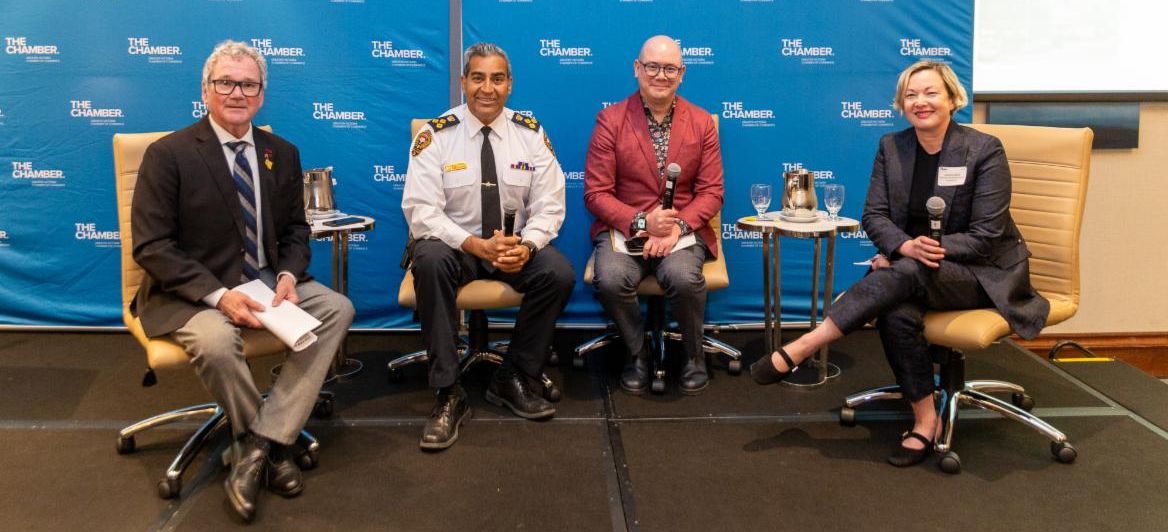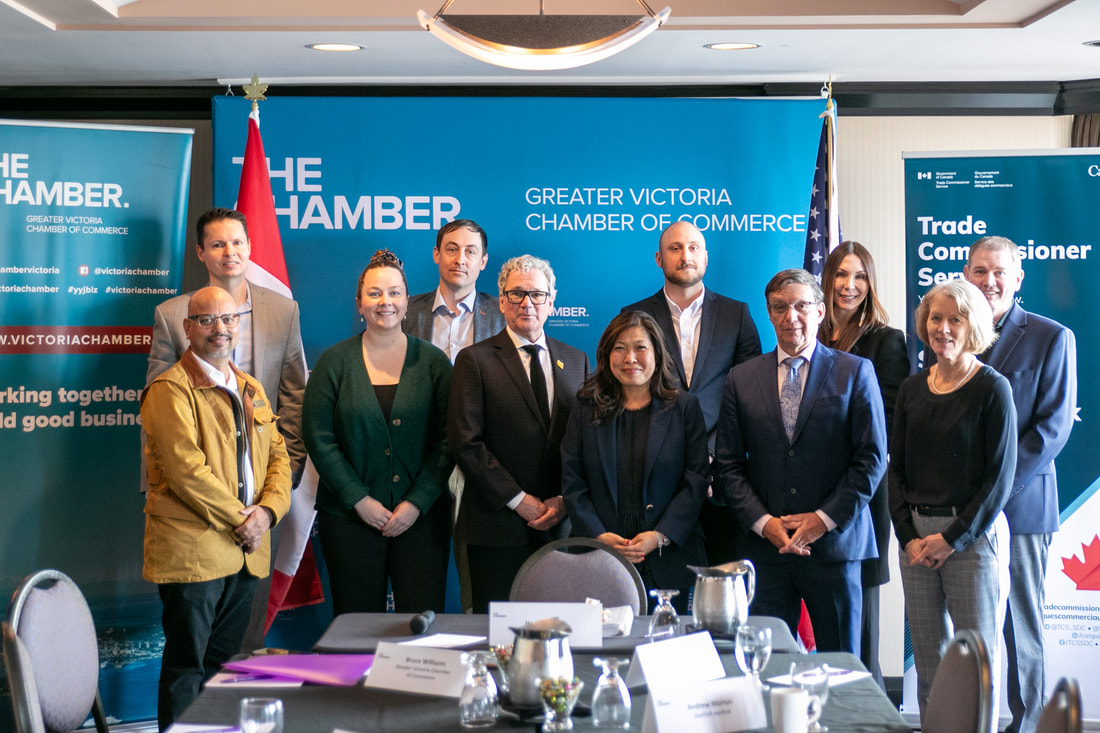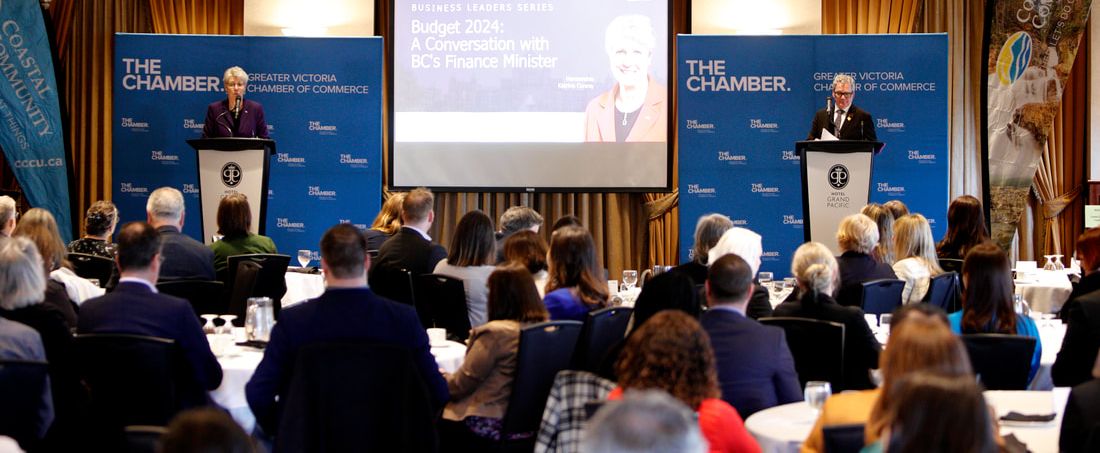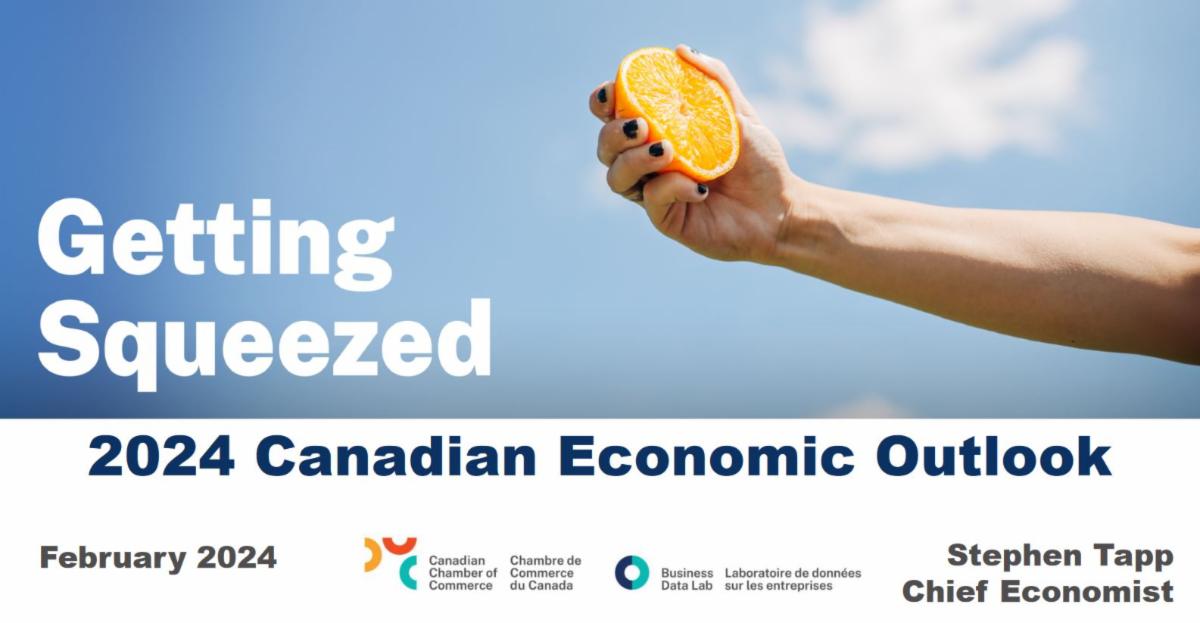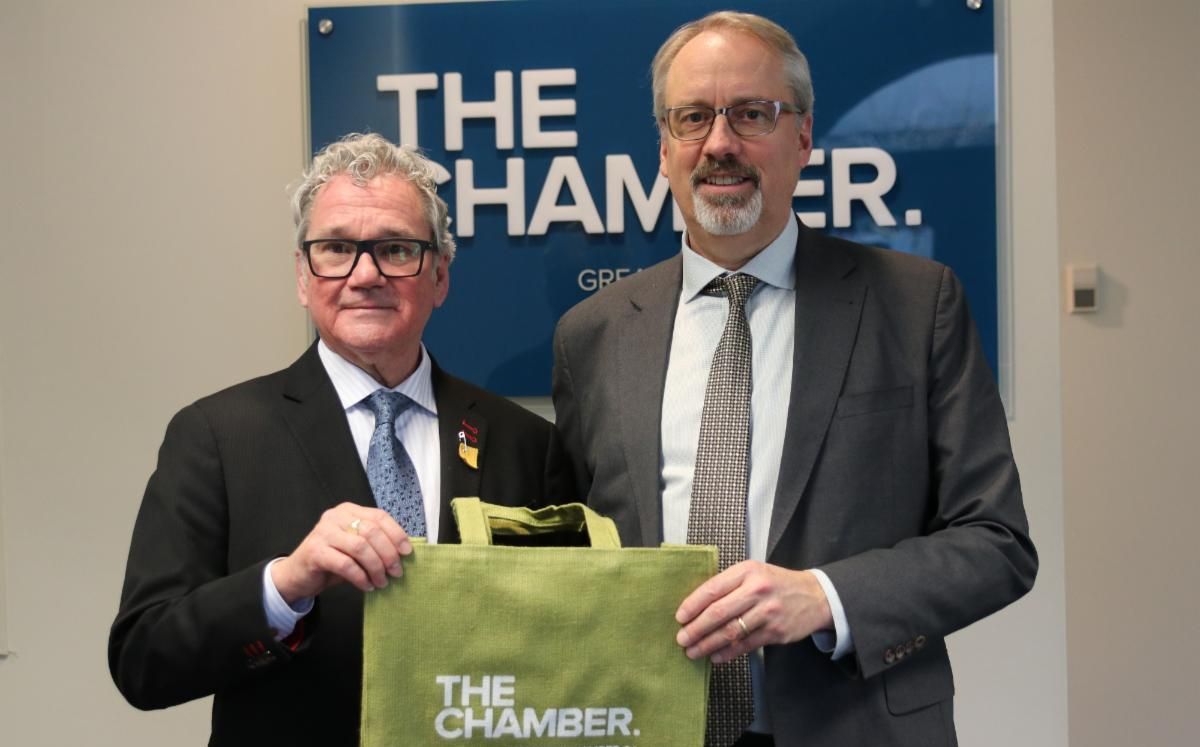|
Another successful AGM is nothing new for your 161-year-old Chamber, but the expert panel convened for yesterday's meeting could not have been more topical.
"Safe communities is a long-standing advocacy priority for us, and we know there is no simple solution," Chamber CEO Bruce Williams said. "A true fix requires a collaborative approach, though as we learned yesterday there are things we can do to improve symptoms while we work on more permanent solutions." After a series of reports of violent incidents in media, Chamber members had many questions about policing, mental health support and housing services. The need for more homes for all income levels is clear, as is a requirement for adequate health care and addiction treatment professionals. Those solutions will take time, even as the political will grows to invest in foundational change. While mistakes have been made, including in the early days of the pandemic when screening for supporting housing wasn't as closely monitored as it is now, progress is being made. The Chamber is working on policy issues such as legal reforms to keep repeat offenders off the street, and police are partnering with health authorities to enforce laws while assisting people in distress. "We can't ignore these issues facing the business community, but we also have a responsibility to not sensationalize them," Williams said. "Going Downtown is safe and our region really is one of the best cities in the world. That said, as with any city, if you don't feel safe, stay away from the few spots that are troubled, stay informed about what governments are doing and let's all be part of positive change." The slight increase to inflation reported yesterday is not outside the range that could jeopardize an anticipated interest rate cut in June.
Statistics Canada reported yesterday that the Consumer Price Index rose to 2.9% in March — up from 2.8% in February. Gas prices were the biggest reason for the rise. Without those fuel costs, March's inflation actually slowed from the previous month. "Many inflation indicators are trending in the right direction and interest rate cuts are still on the table for the Bank of Canada’s interest rate announcement in June," the Conference Board of Canada stated, adding that getting to 2% inflation target could take awhile. Many employers are forecasting wage growth and consumers still see prices rising in the months ahead. "While there is still one more CPI release to come before the Bank's next policy decision, (yesterday's) data keeps us on track to see a first rate cut at that June meeting," CIBC Executive Director of Economics Andrew Grantham said. A new waterfront neighbourhood has been proposed for the area around the Capital Iron District. In an article in the Times Colonist, Reliance Properties CEO Jon Stovell said its plan for an arts and innovation district will go before City of Victoria council on April 18.
The proposal includes preservation of heritage buildings along Store Street and 12 new buildings over two city blocks adjacent to the Upper Harbour. The area known as the Capital Iron lands is bordered by Chatham, Discovery and Government streets. If the proposal is approved, the area will be home to 500 new housing units and provide working space for 1,800 people. It will also serve as a new home for the Art Gallery of Greater Victoria. The District of Saanich's plan for the area around Uptown received a boost on Monday as the province announced it has secured land for a new transit-oriented development.
“Our communities are growing quickly, and people need affordable homes close to public transit, so they can get to where they need to go – and get ahead in life,” said BC Premier David Eby, who will be speaking to Chamber members on April 30. “This new development in Saanich will create a vibrant, connected community where people can find everything they need at their doorstep.” The land was bought by the BC Ministry of Transportation and Infrastructure’s $394-million property acquisition fund. Early plans for the area in Saanich include hundreds of new homes, public spaces and active-transportation connections. There will also be new retail and commercial spaces. Other suggested services include child care, community health and educational facilities. The development will integrate the Lochside and Galloping Goose regional trails to make it a hub for active transportation and BC Transit services, with connections to downtown Victoria, the University of Victoria, the Westshore and the Saanich Peninsula. “The Uptown-Douglas area is the perfect location for a high-density, transit-oriented development and regional transit hub that will no doubt be transformative for this community," Saanich Mayor Dean Murdock said in the news release. Luke Mari, principal of Aryze Developments commented on the announcement, saying “The best transportation plan is a land-use plan. When we put the right homes in the right places – near existing services amenities and transit – we can reduce our dependence on private car use.” Hurry up and wait. That seems to be the message from the Bank of Canada today, after it held its target for the overnight rate at 5%. The Bank's Governing Council would like to see evidence that inflation will continue to trend down before announcing cuts. Optimism remains that there will be enough evidence by the time the Bank makes its next rate announcement on June 5.
"We currently forecast a first interest rate cut in June," CIBC Executive Director of Economics Andrew Grantham said in a media release. "To steal a line from (Bank of Canada) Governor Tiff Macklem's press conference today, that outlook still appears to be within the realm of possibility." The Bank of Canada released its Business Outlook Survey as well as its Survey of Consumer Expectations this week.
The findings show that business conditions have improved in the first quarter of 2024. It's the first positive change in almost two years. The survey also found that fewer Canadian businesses are planning for a recession this year. There was more good news as labour constraints and supply chain challenges are less of a problem. However, businesses reported facing new burdens from taxes and red tape. Consumers said inflation and interest rates are affecting their household budgets, though there was less pessimism about the future of the economy and job prospects. Peter Hayman is the new leader of Vancouver Island South Film & Media Commission. Hayman will replace current film commissioner Kathleen Gilbert, who is retiring April 30.
The not-for-profit organization promotes Greater Victoria as a premier location for the international film industry. The commission has its roots as a Greater Victoria Chamber of Commerce committee, starting in 1974, before it became the Victoria Film Commission in 1983. Hayman lives in North Saanich and was a studio musician and songwriter who studied film at UCLA, and worked as a film editor, producer and director. He founded a production company and has experience integrating new and traditional media. “I look forward to sharing my own enthusiasm with those looking for the perfect place to create their film and media projects,” Hayman said in a media release. Now more than ever it is vital for governments to reduce the burden on business to spur the investments needed to increase productivity. Doing so will inoculate our economy against runaway inflation, said the Bank of Canada's Senior Deputy Governor Carolyn Rogers on March 26. "An economy with low productivity can grow only so quickly before inflation sets in. But an economy with strong productivity can have faster growth, more jobs and higher wages with less risk of inflation," Rogers said. "That’s why I want to talk about Canada’s long-standing, poor record on productivity and show you just how big the problem is. You’ve seen those signs that say, 'In emergency, break glass.' Well, it’s time to break the glass." Rogers said there was a spark of hope during the pandemic as business showed resourcefulness and ingenuity. However, unlike what is happening in the U.S., Canadian firms reverted to low levels of productivity from before the pandemic. To increase productivity, businesses and their employees need three things:
"Weak investment has been a problem in Canada for a long time. You can go back 50 years and find a persistent gap between the level of capital spending per worker by Canadian firms and the level spent by their US counterparts," Rogers said, noting it's harder for new businesses to compete and too much red tape reduces the incentive to change and evolve. "Higher productivity should be everyone’s goal because it’s how we build a better economy for everyone," she said. "When a business gives workers better tools and better training, those workers can produce more. That, in turn, means more revenue for the business, which allows it to absorb rising costs, including higher wages, without having to raise prices." The BC Provincial Nominee Program is being updated to help people new to Canada better understand what is required to be nominated for permanent residency through the BC PNP. The program is the provincial government's only tool for directly selecting immigrants for permanent residency. The program currently prioritizes workers in health care, construction, early childhood education and other in-demand jobs.
"The BC PNP is competitive, but some recruiters misrepresent it as an easy pathway to permanent residency," the provincial media release said. "These updates will give people a better understanding of the education, experience and language skills that they need to be considered for nomination. The program updates align with new measures to protect international students from predatory institutions and recruiters, such as:
"The Chamber continues to work closely with our region's post secondary schools to support their highly successful international student programs," Chamber CEO Bruce Williams said. "The University of Victoria, Camosun College and Royal Roads University have set the bar for the country when it comes to attracting and training people who contribute to our country." A recently released report by Grant Thornton says Canada's real estate industry is looking for optimism in uncertain times. The report highlights current trends impacting the real estate industry, as well as trends across residential, retail, office, industrial and alternative asset classes.
Ongoing concerns include developmental pressures created by a shortage of labour in construction, environmental challenges as governments try to meet climate change targets and stubbornly high interest rates that are dampening investment. "The general economic uncertainty we currently face has left many organizations with less appetite for risk and a resultant focus on risk management," the report states. "To secure financing, borrowers need to get out ahead of their lenders and present a balanced risk profile. It will be increasingly important to present a transparent financial picture, get to know your lenders more closely, and get in front of renewals earlier in the process so that you have time to address potential concerns. Borrowers with less liquidity or poor cash flow are going to have a more difficult time securing financing, and those that do will see less favourable terms." Canada's Finance Minister and Deputy Prime Minister Chrystia Freeland made a surprise visit to Victoria on Monday for a meeting with BC Premier David Eby. With the federal budget coming on April 16, Freeland was in town to promote her government's investment in housing across Canada. "For me, it's actually pretty simple," Freeland said at a media event ahead of her meeting with Eby. "It's housing, housing, housing. Supply, supply, supply, affordability, a strong economic plan that delivers great jobs and a real focus on younger Canadians." Freeland stated $34 million in federal funding has helped create homes in Greater Victoria — something the Greater Victoria chamber continues to call for to help our region meet the demand at the root of housing affordability. Freeland highlighted Sawyer Block on Fort Street, which has 60 rental apartments, and a project in Cook Street Village that helped build 47 rental apartments. "Through the Apartment Construction Loan Program, we will also be offering low-cost loans to post-secondary institutions — like the University of Victoria ... so that they can build more student housing on- and off-campus," Freeland said in her presentation. "This will help more students to find housing they can afford close to where they study, and at the same time, it will mean that there are more homes available for those who live in those same communities year-round." Adding on-campus housing is another long-standing chamber advocacy priority, Chamber CEO Bruce Williams said. "This is a big win for our advocacy work. We know that one of the biggest challenges for building homes in Greater Victoria is our land constraints," Williams said. "Post-secondaries have the space. They need the right financing to make housing work and this is part of that solution." Chamber members have an opportunity for a seat at the table with BC's Premier as The Chamber hosts the Hon. David Eby on April 30 for a breakfast and discussion about business in BC.
"We know our members have many questions for the Premier during this electing year, and I'm grateful for this opportunity to get answers and learn more about the government's plans to help the private sector strengthen our economy," Chamber CEO Bruce Williams said. The MLA for Vancouver-Point Grey became leader of the BC NDP in October 2022 and BC Premier in November 2022. Before he was elected, Eby was the Executive Director of the BC Civil Liberties Association, an adjunct professor of law at the University of British Columbia, and president of the HIV/AIDS Legal Network. He also served on the Vancouver Foundation's Health and Social Development Committee. Chamber events are always popular so reserve your spot now to ensure you have a seat at the table. Leading to Election: Breakfast with Premier Eby
A special roundtable held today gave Chamber members doing business in the US a chance to talk trade directly with federal Minister of Export Promotion, International Trade and Economic Development Mary Ng.
During the face-to-face meeting, the Minister said that Canadian businesses are all part of a Team Canada approach needed to remind Americans that Canadians are key customers and important allies. “The US is our closest friend and biggest trading partner. No one knows that better than Greater Victoria businesses — the US is BC’s biggest customer, importing more than $30 million in goods and services annually," Minister Ng told The Chamber after the meeting. "Through our Team Canada engagement, we are working together at all levels to make sure Canada and our relationship with the US stays centered in the minds of Americans. That effort needs the help of our businesses, like the members of the Greater Victoria Chamber of Commerce, to help highlight the incredible strength of this partnership. At the heart of this work is advancing opportunities for Canadian workers, businesses, and communities across the country and right here in BC.” Among the many questions brought up during the discussion were challenges with the development of innovative mining equipment. Canadian firms face unfair competition from some overseas companies that don't have the same strict environmental and labour standards. Minister Ng noted that the Canada United States Mexico Agreement can give BC companies an edge because it includes prohibitions against trade that involves forced labour or bad environmental practices. The Minister also heard from Chamber members who wanted help making the connections needed to get products on US shelves, as well as others asking for a better coordinated national approach to procurement and distribution of goods and services. To share questions or comments with the Minister's team, email [email protected]. Canadians will find out next month whether the federal government is paying attention to the growing calls from business to improve our country's productivity, competitiveness and standard of living.
Federal Finance Minister and Deputy Prime Minister Chrystia Freeland announced today that Budget 2024 will be presented in the House of Commons on April 16. The Canadian Chamber submitted a list of recommendations during budget deliberations that came from business leaders across the country. Many of these are echoed by members of the Greater Victoria Chamber of Commerce. "We need economic growth to be driven by the private sector, and some of the changes that can be done on a federal level are simple — and cost effective — changes to red tape," Chamber CEO Bruce Williams said. "We know innovation is driven by business and it's time for government to focus on policies that encourage investment in the infrastructure needed to build a sustainable and resilient economy." Among the recommendations are to:
Payroll tax change welcomed, though questions remain about province’s fiscal path: Budget 20242/28/2024
Businesses with payrolls of up to $1 million will now qualify for an exemption from the Employer Health Tax, B.C. Finance Minister Katrine Conroy announced last Thursday during the unveiling of the 2024 provincial budget.
“Increasing the EHT exemption is welcome news for business. The experience in other provinces has shown we can expect an increase in productivity as employers have more room to increase wages and promote staff,” said Bruce Williams, CEO of the Greater Victoria Chamber of Commerce, noting The Chamber has been calling for the change since the new tax was introduced in Budget 2018. Minister Conroy joined Chamber members the day after budget day to answer questions and highlight initiatives such as a new tax to deter home buyers from quickly reselling their properties, and a promise to cover the cost of one cycle of invitro-fertilization. Asked about efforts to improve public safety, Conroy noted the province has increased investment in mental health and addiction treatment programs. Business leaders were also concerned about rising debt with the budget including a record deficit. The provincial government is raising the minimum wage by 65 cents, effective June 1.
The increase means the lowest an employee can be paid is $17.40 per hour, up from $16.75. The rate reflects annual inflation in the province. "We know many Chamber members already pay more than the minimum, but inflating the base rate inevitably increases the wages of other employees, which adds further costs during a time of economic uncertainty," Chamber CEO Bruce Williams said. "Businesses are already working hard to find and keep good workers, and we understand that increasing wages is part of that. And while we appreciate that the government is giving businesses time to adjust and offering future certainty by tying the increase to inflation, we think there are better ways government can lower the cost of living to make our province more affordable." The shift to working from home that was sparked by pandemic restrictions is continuing to impact the commercial real estate sector.
CBRE's Canada Real Estate Market Outlook 2024 reports that office vacancy, at 8.7%, remains elevated in Greater Victoria due to turbulent conditions. In an interview with the Times Colonist, CBRE Ltd. Victoria Vice-President Ross Marshall said landlords are trying to be as accommodating and innovative as possible to keep clients and find new ones. Downtown spaces also face challenges from perceptions about parking and social distress in some areas, Marshall said. Greater Victoria has 9.37 million square feet of offices, with rent for Class A spaces going for $27.25 per square foot. "The completion of strata developments in the Westshore will relieve some of the industrial shortage in Greater Victoria and is currently just over 65% pre-sold," the report states. "Inventory levels still remain heavily undersupplied outside the Westshore. Asking rates are projected to stabilize around mid-2024 after tenants fully occupy investor-purchased strata units and the availability rate normalizes." The future of BC Ferries is easier to visualize, now that concept drawings of proposed new vessels have been released. Up to seven of the new ships are expected to be ready for service in 2029.
On Monday, BC Ferries issued a Request for Supplier Qualification for its New Major Vessels program, with the aim of issuing a Request for Proposals this summer. The new vessels will carry up to 360 standard sized vehicles and 2,100 people, and will replace vessels currently operating between Vancouver Island and Metro Vancouver. Those ships have a capacity of 250-310 vehicles and 1,200-1,500 people. “These vessels — greener, more efficient and standardized — represent the future of ferry travel in our province," BC Ferries’ President and CEO Nicolas Jimenez said. "They will significantly increase daily capacity, provide an enhanced customer experience, improve reliability and reduce environmental impacts.” The basic design is being developed in collaboration with LMG Marin AS, and will have engines capable of using bio- and renewable fuels, as well as a battery-hybrid propulsion system that can be converted to full battery-electric operation once shore-based recharging infrastructure becomes available. 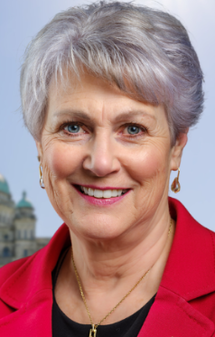 Next week, Chamber members will be among the first to learn about the 2024 provincial budget and hear directly from BC's Finance Minister. The Speech from the Throne is set for Feb. 20, followed by Budget Day on Feb. 22 and the Finance Minister lunch with the Greater Victoria Chamber of Commerce on Feb. 23, sponsored by Coastal Community Credit Union. "As the oldest Chamber in Western Canada, we have a long tradition of connecting government with the private sector," Chamber CEO Bruce Williams said. "That includes the tradition of being the first chamber to host the finance minister after the provincial budget is unveiled. We're thrilled Minister Conroy will join us, once again, and I look forward to seeing many of our members at the Hotel Grand Pacific." There's reason for optimism in Greater Victoria's real estate sector, as a sense of stability is returning after what felt like truly turbulent times.
"Mortgage rates have levelled out, inventory is slowly creeping back up, and we are no longer in that highly pressurized market of recent years which created complicated and sometimes stressful conditions for buyers and sellers," Victoria Real Estate Board Chair Laurie Lidstone said in the organization's latest news release. "If balanced conditions continue, buyers and sellers will have more time to make decisions and there will be less pressure on pricing. Of course, there are many factors that impact the market here in Victoria, and, as we've seen in the past, things can change very rapidly." The real estate board had 2,140 active listings for sale at the end of January, a 23.1% increase from 12 months ago. The benchmark value for a single family home in January was about $1.24 million, down from December's value of $1.27 million. The benchmark value for a condominium in the Victoria Core in January was $559,000, down from the December value of $562,000. Understanding economic trends is invaluable to helping businesses plan for the future. The Chamber relies on a number of sources for information and analysis, including our national network.
On Tuesday, Canadian Chamber Chief Economist Stephen Tapp provided members of The Chamber's Public Policy and Advocacy Committee with his insights. "We're fortunate to have access to a deep pool of experts who help us make effective use of our advocacy efforts," Chamber CEO Bruce Williams said. "The Greater Victoria Chamber of Commerce has a long history as Western Canada's first chamber and we continue to play an active role with the Canadian Chamber." Tapp spoke about the state of the economy and expectations for interest rate cuts, using the latest numbers from the Business Data Lab. Click the image to view Tapp's presentation. For information on joining a Chamber committee, go to victoriachamber.ca/committees for contact info. Canada is a trading nation, and many businesses in Greater Victoria provide goods and services to an international customer base. Building connections across borders is vital to helping business operate as smoothly as possible.
On Monday, the Chamber welcomed Vancouver-based US Consulate General Jim DeHart to Victoria. "I've spoken with Mr. DeHart during trade missions in the past and he's always expressed an interest in learning more about Greater Victoria and Vancouver Island," Chamber CEO Bruce WIlliams said. "I'm glad we were able to host him for a roundtable with some of our region's business leaders for a discussion on trade and cross-border relations." Topics covered an array of interests, including labour force mobility, credential recognition and ongoing efforts to streamline regulations. Investing in celebrations of sports, arts, culture and farming helps build great communities. The economic return also benefits many tourism and hospitality businesses — a sector that is still recovering from the pandemic and the current slowdown in consumer spending.
The Chamber continues to be a vocal advocate for this sector, and we applaud this morning's news that the BC Fairs, Festivals and Events fund is being extended. “The BCFFE program single-handedly saved our business and that of many of our colleagues here in BC," 17 Black Events executive director Scott Gurney said. "The program has also ensured that businesses within BC’s live event ecosystem, like specialty service providers, suppliers and rental companies, have been able to survive, too. The impact of this program reaches far and wide with its economic outcomes, but more importantly, from a social point of view, it has ensured that British Columbians have continued access to arts, culture and live events.” Events between April 1, 2024, and Sept. 30, 2025, are eligible for funding to cover expenses ranging from operational costs, Indigenous consultation and honorariums, to venue rental, marketing, wages and promotion. Applications are being accepted until 11:59 pm, Feb. 25. Organizations are encouraged to submit their applications as soon as possible. “We are extremely grateful for the past two years of BCFFE funding," Rifflandia Entertainment Company president and CEO Nick Blasco said. "Suffice to say, the program has been essential to the growth and future of our festival and so many others throughout the province.” The Secondary Suites Incentive Program, introduced to all BC municipalities last fall, is being expanded to 16 regional districts, including the Capital Regional District.
“We’re using innovative solutions to make it easier for homeowners and communities to build homes faster, so people can live and work in the communities they love,” BC Minister of Housing Ravi Kahlon said in a news release. The three-year pilot SSIP will provide about 3,000 homeowners with forgivable loans for as much as $40,000 to create a new secondary suite or an accessory dwelling unit on their property. To qualify, the units must be rented below market rates for at least five years. In a separate news release, Kahlon also announced that the province issued a request for proposals that could lead to BC adopting an innovative housing solution used in places such as Seattle and New York City. A common practice in Europe, the solution involves allowing single staircases in residential buildings by updating an 80-year-old rule in BC's building code that currently requires two stairwells. The change would allow for larger apartments with more daylight, cross breezes and greenspaces. "The Chamber encourages all levels of government to embrace innovations that allow builders to provide the housing supply we need," Chamber CEO Bruce Williams said. "Looking at how other places in the world have solved the same issue we face makes sense." The Chamber is following up on concerns expressed by local post-secondaries facing a serious and unanticipated financial burden from the surprise federal announcement to cap the international student program.
Yesterday, the organization representing Canadian schools sent a joint letter to federal Immigration Minister Marc Miller. "We urge your department not to impose the letter of attestation requirement for college and undergraduate study permit applications until at least March 31 or until the provinces establish an effective process," the letter from Universities Canada and Colleges and Institutes Canada stated. "Additionally, we request urgent consultations with the sector to modify the cap policy, clarify the many outstanding questions and mitigate the negative impacts." On Monday, BC announced new regulations that will constrict the number of international students in the province. Of BC's 545,000 post-secondary students, 175,000 are from 150 countries other than Canada. "After speaking with our members impacted by these changes, The Chamber is concerned that this policy is being presented as a solution to the housing crisis when it will significantly reduce revenue needed by schools," Chamber CEO Bruce Williams said. "A better solution is to invest in more on-campus housing so that schools continue to provide the workforce our economy needs, while creating a pathway for foreign students to become taxpaying new Canadians." |
Categories
All
|
Copyright © 2021 Greater Victoria Chamber of Commerce. All rights reserved.
#100 – 852 Fort St., Victoria, BC V8W 1H8, Canada | Phone: (250) 383-7191
[email protected] | Site Map
#100 – 852 Fort St., Victoria, BC V8W 1H8, Canada | Phone: (250) 383-7191
[email protected] | Site Map
Notice a typo or broken link? Please let us know so we can fix it ASAP. Email [email protected]

